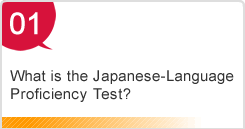The Japanese-Language Proficiency Test (JLPT) under joint organization of the Japan Foundation and Japan Educational Exchanges and Services (previously Association of International Education, Japan) started in 1984 as a test to measure and certify the Japanese-language proficiency of those whose native language is not Japanese. In the first year the JLPT was conducted in 15 countries, and approximately 7,000 examinees took the test. Since then, the JLPT has become the largest Japanese-language test in the world, with approximately 610,000 examinees in 62 countries and areas worldwide in 2011. This success is entirely due to the support and cooperation of all involved.
A quarter century since its inception, the JLPT has been undergoing various changes in recent years. In 2009, the JLPT started to be offered twice a year in July and December, as opposed to only once a year in December previously. The year 2010 saw the introduction of the "new" JLPT, which focuses on communication abilities to meet more diverse student needs and is designed based on analysis of data collected over the years.
Today the JLPT is actively used in every corner of the world. We continue to strive for further penetration and improvement of the JLPT in order to provide a wide range of Japanese-language students in all sorts of learning environments with more and equal opportunities to take the test in coming years.
May 2012
The Japan Foundation
Japan Educational Exchanges and Services

-
- *Outside Japan, the test may be held only in July or December in some cities. Click here for the test schedule in your city.
End of Text










